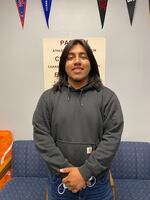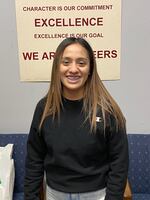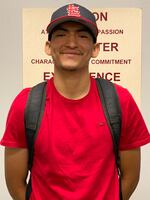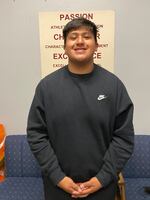It’s a month until high school graduation. For many high school seniors in Oregon, it’s a race to complete classes and iron out college plans for the fall, in a year like no other.
The pandemic has placed extra pressure on all students, but for high school seniors who are the first in their families to attend college, navigating school applications, scholarships and financial aid — without the usual support at school — is even more challenging.
“It’s been kind of rough on us — all of the students,” Rafael Pereyda, a senior at McLoughlin High School in Milton-Freewater, said. “I think I’m somewhat prepared, but overall I’m not that prepared because learning through online classes is kind of hard because it’s just like it’s all new.”
Pereyda is McLoughlin High’s valedictorian. He’s lived his whole life in Milton-Freewater, a small city nestled in the Walla Walla Valley of Eastern Oregon, just a few miles from the Washington state line.
Pereyda said he was initially thinking about going to a four-year university like the University of Oregon or Oregon State, but ultimately he decided on Blue Mountain Community College, which has a location in Milton-Freewater.
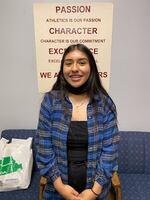
Emily Martinez, 18, is a senior at McLoughlin High School in Milton-Freewater, Oregon.
Courtesy of McLoughlin High School / McLoughlin High School
“I don’t want to be too much in debt because of college,” Pereyda said. “And community college is a lot cheaper, so I’ll probably do that for a year or two and then I might transfer to a bigger school.”
Pereyda said he only really decided he wanted to go to college around the beginning of this year, and he missed some of the bigger scholarship deadlines that passed late last year that could have given him a “full ride.”
Nearly two-thirds of McLoughlin High’s students are Hispanic or Latino, according to the latest figures from the Oregon Department of Education. Susie Ellis, a secretary in the McLoughlin High counseling center, says many of them would be the first in their families to go to college.
“There’s a lot of that, ‘Oh, I can’t go to college,’” Ellis said, “Well, no, no you can.”
In a report released in February, Challenge Success — a school reform nonprofit, in collaboration with the Stanford Graduate School of Education and NBC News — found increased stress among high school students last fall.
The study’s findings were based on responses from more than 75,000 high school students between fall 2018 and fall 2020. During fall 2020, the survey was administered to more than 10,000 students with additional questions related to the pandemic.
Of the students surveyed last fall, 59% said their worries about college had increased. For Black and Hispanic/Latino students, 63% reported an increase in school-related stress; higher than the 55% of white students reporting greater stress.
Pereyda and some of his classmates said Ellis helped them lay out a path to college. But with the coronavirus pandemic uprooting in-person learning and causing extra stress, some of the high school seniors still feel anxious.
Some McLoughlin High students say without guidance from family members who have been through it before, it’s hard to keep up with the college admissions process.
“It’s always kind of tough and hectic for some of these kids from January on that are just unaware of what it takes to go to college,” Ellis said. “But to survive a pandemic … It’s just been rewarding to see how well they’ve risen above everything that’s been thrown at them.”
Colleges pivot to online recruitment
On the other side of the admissions process, colleges and universities have had to work outside of the box in order to recruit students during the pandemic.
“The primary way we recruited students was to connect with them in-person. We would go to their high school, to the career center or to the counselor’s office and connect with students, or go to a college fair that the school was putting on,” Genesis Meaderds, Admissions Director at Eastern Oregon University, told OPB.
“When COVID hit, our primary way of recruiting was no longer an option.”
Meaderds said Oregon’s smallest public university had to pivot primarily to virtual events and tours.

Eastern Oregon University in La Grande has had to adjust like other public and private colleges to recruit students during the pandemic.
Rob Manning / OPB
Initially when switching to a virtual preview day a year ago, EOU saw double the number of registrants, Meaderds said. But as the pandemic continued, she said students appeared to become less interested in online offerings, leaving them with a dilemma
“So how do we connect with students on social media … How do we make sure that they are aware of EOU being an option?” Meaderds asked.
Meaderds said EOU’s efforts to expand its digital presence have brought some benefits. For the digital preview day this spring, EOU saw students register from all over the world, including Haiti, Mexico and the Pacific Islands.
“If we didn’t have the virtual event, they definitely would not be able to see what EOU has to offer,” Meaderds said.
On the other end of the state, the University of Portland has also had to make the virtual switch, and seen some of the same effects as EOU.
“You’re able to maybe do an event on the East Coast when normally you wouldn’t travel there because of budget constraints,” Jason McDonald, UP Dean of Admissions, said. “So I think the advantage, or what we’ve seen come out of this, is that virtual events open the door in a way to provide students more opportunities that maybe you wouldn’t necessarily have given them by not traveling to their certain area.”
UP says the connections have resulted in additional students. McDonald says from 2019 to 2021, fall enrollment went up 10% from its “outreach markets” — students from the Midwest, East Coast and southern states where the university does not normally travel to recruit frequently.
McDonald said the pandemic has also shifted how UP views its applicants. Like many schools, the private school in North Portland went test-optional during the pandemic — acknowledging that many students were not able to take the typical college admissions tests such as the SAT.
“We’ve always done a holistic approach, really trying to encompass everything with the applicant evaluation,” McDonald said. “And so I think that was even heightened more with some limited grades and no tests. I think colleges had to pivot that way to provide flexibility for students on the application side.”

University of Portland campus.
C Bruce Forster
Addressing the academic gap
Meaderds with EOU said recruiting and admitting students is just half the battle. Colleges will also need to do major work to ensure students are supported when they get to campus in the fall.
“We’re in conversations now about providing students support academically so when they come to campus that gap isn’t as large, as we know there will be a gap,” Meaderds said.
In the national Challenge Success report, nearly half of surveyed students reported feeling less engaged in their school work last fall compared with before the pandemic. A similar share of students said they were putting in less effort.
In Oregon, state officials scaled back requirements on high school students a year ago to “mitigate negative consequences from any lost learning time due to COVID-19,” according to the state education department. Those changes included replacing grades for the end of the 2019-20 school year with “pass-incomplete” marks, and suspending the “essential skills” testing requirement for graduates in both 2020 and 2021.
The instructional disruptions have led college administrators to consider stronger support systems for incoming freshmen.
Meaderds noted that EOU already had a “summer bridge” program prior to the pandemic, to specifically serve international students. There are now conversations about expanding some sort of catch-up programming for incoming students who may need it — especially students coming from underrepresented communities.
“EOU is focusing on ensuring that students are successful once they get here,” she said. “We get a large portion of our students from Malheur County, Umatilla County areas with high Latinx populations, and a lot of rural students. And we want to ensure that these students coming from their small communities are successful at EOU during the pandemic.”
That potential gap in learning is on the mind of Hector Castillo, a classmate of Pereyda’s at McLoughlin High.
“I just feel like I didn’t learn what I was supposed to learn this year because it was way different on the computer than in person,” Castillo said. “So that’s just a thing I’m, like, worried about right now.”
The first time leaving home
Some aspects of being the first in your family to go to college are the same, whether there’s a pandemic going on or not: worries about leaving home and cost of college, and the thrill of starting something new, someplace new.
Castillo and other students at McLoughlin said they are anxious about jumping into college-level classes after learning remotely for the majority of last year. But, they are excited about the prospects of new experiences in new places.
Castillo is trying to decide between enrolling at nearby Eastern Oregon University or heading to Chemeketa Community College in the Willamette Valley. He said he wants to play soccer at either school but is also looking into programs in construction or engineering.
Castillo said EOU’s soccer coach told him that he reached out too late to be considered for a sports scholarship. He’s still waiting to hear back about other scholarships.
Like many of his other classmates, Castillo has lived in the small city of Milton-Freewater for his whole life.
“I’ll probably feel homesick and stuff,” Castillo said. “I feel like I will just because I haven’t been away from [my parents], so it’ll just be like something new.”
But he said the upcoming fall brings a lot of excitement too: “meeting new people, this new school and like learning new things and stuff, and soccer is a little part of that excitement as well.”
That mix of excitement and anxiety is also the experience of Andy Ceja, another student at McLoughlin. He’s especially concerned about leaving home for the first time, because his family relies on him.
“They don’t speak English. I’m usually there helping them with anything and everything they need help with — whether that’s translating, talking with them about taxes, anything like that,” Ceja said about his parents.
Ceja said he’s on a waitlist for the Northwest Lineman College in Meridian, Idaho — roughly a four-hour drive from Milton-Freewater. He wants to start winter term, after he’s been able to work, save money and maybe move out of his parents’ house.
“That was kind of an issue at first, but they kind of just accepted it,” Ceja said. “They knew it was probably the best thing for me to broaden out and do other things. They’re sad about it, but they’re supportive at the same time.”
For some students, the security and affordability of staying close to home and family is competing with the allure and uncertainty of moving away.
Emily Martinez said she’s deciding between heading off to University of Portland, or attending Walla Walla Community College, 15 miles away in Washington. She said the lower price of staying home and going to community college is part of her decision. But she’s also thinking about the emotional pull of staying close to her family.
“When I would talk to them about the University of Portland, they felt, you know, sad because I’m going to leave,” Martinez said. “But when I talk to them about [Walla Walla Community College] … it’ll be closer, I’ll still be living with them in the house. It won’t be as sad.”
But, Martinez said, if she does end up going to Walla Walla, she will end up transferring to a four-year university in Oregon afterwards.
“I do want to go to a bigger city, that was one of my choices in the beginning just to go out there and explore more stuff,” she said. “I feel like it’ll give me a better opportunity.”
Leaving Milton-Freewater for new experiences is a goal on many of the students’ minds. For Ahtziry Villagomez, college would be just the beginning. She’s planning a career of international travel, starting at the International Air Hospitality Academy in Vancouver.
Villagomez said the prospect of working for an airline is exciting, but daunting.
“I’m a little nervous, I’m not going to lie,” she said. “I did grow up in a small town and then going from city to city — I am nervous, but I think personally I can do it, because I want the experience and, like I said, this is a small town, and I would like to go into a new, whole different bigger city. It’s going to open my eyes more.”
“Home will always be here,” Villagomez said, thinking of her family’s roots in Milton-Freewater. “So that’s the way I look at it; this place will always be here.”
Getting to the finish line
First-generation students may not have family to lean on for reminders of application or financial aid deadlines. So high school staff typically step in.
“There are points where it’s just like, you couldn’t ask your parents for help or anything because [you’re] first-generation,” Pereyda, McLoughlin High’s valedictorian, said.
Ellis, with McLoughlin’s counseling center, said her work in helping prepare students changed drastically after the pandemic closed schools a year ago. She’s had to work that much harder to connect with McLoughlin’s seniors.
“I’ve opened up my home,” she said. “‘Come out, I’ll get you a packet of scholarships. I’ll walk you through them.’ And a lot of it was word of mouth, ‘Meet me at the back door of the school, and I’ll hand you all of your transcripts.’”
Prior to the pandemic, the high school would hold an assembly for seniors to talk about applying to colleges, scholarships and financial aid. Students would hear daily school announcements in the halls at McLoughlin High. Now, Ellis said, most of those reminders are sent through Google classroom.
“We have to go an extra mile for these kids,” Ellis said. “More and more we’re kind of changing that. Just because you’re from one family or not, that doesn’t mean you can’t go to college.”
Ellis acknowledged that the pandemic has been tougher on some students than others. But she said she’s happy to have seen them in-person, this spring, and proud of what they’ve accomplished.
“Online is not a successful way to educate our kids, and they miss a lot,” Ellis said. “And so, to see them come in here to be able to be in school for the last two months of their year — it’s fun to watch because they are grasping at everything they possibly can because they’ve missed it and they’re proud of themselves.”
She continued: “This group of these seniors — they’re going to be OK.”

